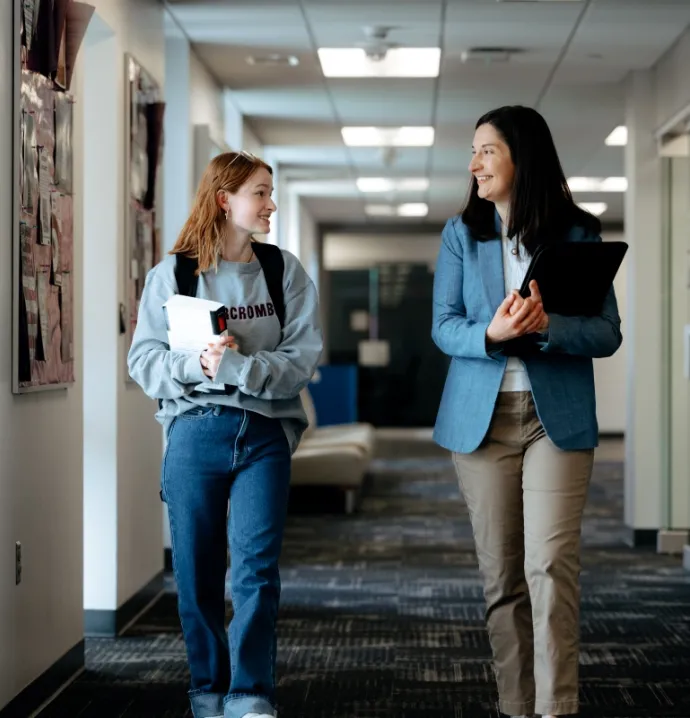Beyond the Uniform
Beyond the Uniform

Courtney Sinnock aspires to become an interior designer. Gage Riggle wants to work as a physical therapist. Dylan Carlsen hopes to be a CIA agent or run for public office one day.
These three career paths couldn’t be more different, yet all three UNI students share a common experience: their involvement in UNI’s Reserve Officers’ Training Corps (ROTC) Panther Battalion.
Army ROTC is a college-level leadership program that prepares students to become commissioned Army officers upon graduation. The program’s courses count as elective credits within a student’s regular college curriculum, and no prior military experience is required. Students can participate for up to two years without committing to military service.
Lieutenant Colonel Erik Lampe, who leads UNI’s Department of Military Science, which oversees the Panther Battalion, highlights the many benefits of ROTC: leadership development, critical thinking skills, teamwork and more. But beyond those advantages, he emphasizes the deeper purpose of service.
“They also get to serve their country and community,” he says.
Among UNI’s ROTC cadets, Lampe sees a shared drive to keep moving forward and a strong willingness to learn.
“That’s the indicator and what helps set them apart. They’re willing to work. They’re willing to set goals and keep developing.”
 Gage Riggle is a testament to that determination. An MS5 cadet, Riggle initially wasn’t sure if college was the right path for him. Instead, he enlisted in the Army, serving as an infantryman before joining the Old Guard, a prestigious unit responsible for military funerals, inaugurations and retirements. He started as a casket bearer before becoming part of Caisson, the military horseman unit.
Gage Riggle is a testament to that determination. An MS5 cadet, Riggle initially wasn’t sure if college was the right path for him. Instead, he enlisted in the Army, serving as an infantryman before joining the Old Guard, a prestigious unit responsible for military funerals, inaugurations and retirements. He started as a casket bearer before becoming part of Caisson, the military horseman unit.
Eventually, Riggle decided to give college another shot, enrolling at UNI as a kinesiology major. The pandemic further strengthened his sense of purpose.
“I saw how scared people were and that there needed to be leaders around who could quell those fears,” he recalls. “That inspired me to go back to the military.”
ROTC, he realized, was a perfect fit.
“I saw ROTC as a great opportunity to learn to be a leader,” he says.
Dylan Carlsen, an MS4, was already serving as a combat medic in the Iowa Army National Guard when he decided to join ROTC in 2018. For him, it was the next logical step in advancing his Army career.
“UNI’s program had a strong reputation, and I saw it as a great opportunity to develop my leadership skills while continuing my education,” he says.
ROTC has lived up to his expectations.
“I’ve had the opportunity to lead, plan and execute various training events, which has helped me grow as both a leader and a team player,” he shares. “Being in a battalion where everyone is pushing themselves to be their best has been incredibly motivating. I have no doubt that when we graduate, we will be prepared to be lieutenants.”
Beyond leadership training, Carlsen has participated in specialized opportunities like Air Assault School, Master Fitness Trainer School and an internship at Aberdeen Proving Grounds in Maryland, where he worked in the Threat Lab.
“These experiences have made my ROTC journey really unique,” he says. “I’ve been able to learn specialized skills, travel and get real-world experience that will help me as an Army officer.”
A history major, Carlsen is passionate about how past events shape the present.
“Studying history has helped me develop critical thinking and analytical skills that will serve me well in my Army career,” he says. “I’m currently set to become an infantry officer and then, after a few years, transfer my skills to Army military intelligence.”
Fellow cadet Courtney Sinnock was inspired to join ROTC by her high school world history teacher, a member of the National Guard. She wanted to pursue a college degree while also gaining military experience.
“ROTC allows me to have a ‘normal’ college life — being involved at school and earning a degree — while also preparing me for a military career,” she says.
Sinnock, an MS1, plans to graduate with her interior design degree in 2028. When she does so, she’ll continue to carry with her the relationships she’s built with her fellow cadets — people who she feels want to help her grow.
“ROTC is like a family, where everyone wants success for their brothers and sisters. I really enjoy getting to spend time with such driven people.”
All three cadets have ambitious goals that blend military service with civilian careers. Sinnock envisions a future in residential interior design while also serving as a military logistics officer. Carlsen plans to begin his career as an infantry officer before transitioning to military intelligence, with hopes of one day working for the CIA. Riggle aims to join the Army—Baylor University DPT program, where he will train as a medical specialist corps officer, preparing soldiers for healthier lives.
Each of these three cadets are grateful to have had ROTC experience.
“It prepares students in ways they might not think about at first,” Riggle says. “I can definitely see it paying dividends in my life.”
For LTC Lampe, seeing the next generation of leaders emerge through the program is inspiring.
“The Army is a people organization,” he says. “Nothing happens in the Army without people, so ROTC is a critical portion of that.”




